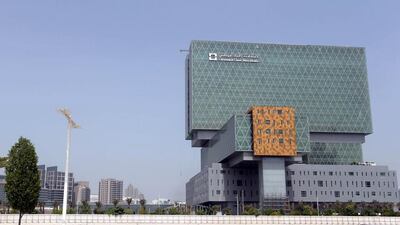A consultancy predicts Abu Dhabi will reduce the shortfall of beds for women’s and child care as more public and private hospitals open in the emirate.
The current shortfall of beds for both normal deliveries and C-sections, is 600 in Abu Dhabi, and 1,400 in Dubai, said Jad Bitar, a partner with Booz and Company and a leader in the firm’s healthcare practice based in Beirut.
“Overall the capacity gap has been closing in Abu Dhabi for the last few years,” said Mr Bitar.
“Still, given the current projects we expect to have a gap of around 200 beds in Abu Dhabi in women’s health by 2017.”
Abu Dhabi-based United Eastern Medical Services will open Danat Al Emarat with 140 beds in the first phase that will be followed by a 90-bed hospital in the second phase.
When it opens in April, the hospital will focus on gynaecology, obstetrics and neonatal care. It is targeting the premium segment in women and child care. All the rooms will be single occupancy with butler and concierge services besides VIP and royal suites.
Apart from Danat Al Emarat, 100-bed BrightPoint Maternity Hospital from NMC Healthcare is expected to open in the first half of next year. And the old Corniche Hospital will be replaced by a women’s health hospital in Sheikh Khalifa Medical City.
South Africa’s Mediclinic, which acquired Welcare Hospital in Dubai, will open its first clinic in Abu Dhabi – Mediclinic Corniche – in February, it said in a filing.
Currently, around a quarter of the deliveries in town are handled by Corniche Hospital.
“We looked at the demographics and saw that we have a single player, Corniche Hospital, which is open to all demographics,” said Mohammed Ali Al Shorafa Al Hammadi, the managing director and chief executive of United Eastern Medical Services. “And we looked at how we can cater to the high-end, premium level because in the long term it brings the costs down.”
Quality services are important to attract and retain patients. Prices of procedures will rise naturally in parallel with improved quality as more nurses are needed per bed, for instance, said Mr Bitar.
On average, the price of a medical procedure in Abu Dhabi is 30 to 100 per cent higher than other parts of the Gulf, he said.
The average cost of a normal delivery in Abu Dhabi is Dh22,635 and Dh33,500 for a Caesarean.
“While prices fluctuate between hospitals [it] can go up to three times for the same procedure,” Mr Bitar said.
Singapore’s ParkwayHealth will manage and operate the Danat Al Emarat Hospital located near Officer’s City in Abu Dhabi – its first outside South East Asia. ParkwayHealth is part of the Parkway Group, and runs hospitals in Malaysia, India and Brunei. Its Mount Elizabeth Hospital is popular with Emiratis seeking health treatment in Singapore.
“They know how to retain patients and produce economically viable projects,” Mr Al Hammadi said, referring to ParkwayHealth.
Danat Al Emarat is spending Dh700 million on phase one and will have taken three years to complete. The overall project cost stands at Dh1.2 billion.
The hospital expects to stem the flow of patients to Dubai and expats moving to their home countries for deliveries.
It also expects to reduce the number of medical tourists going abroad for breast cancer treatment and neonatology, a subspeciality of paediatrics that consists of medical care of newborn infants.
United Eastern Medical Services, which started four years ago, runs five outpatient clinics and two pharmacies under the Health Plus brand name.
It has also tied up with the UK’s Moorfields Eye Hospital and is looking for a location to open a Dh25m eye hospital in the capital. Three more clinics are in the pipeline.
ssahoo@thanational.ae

